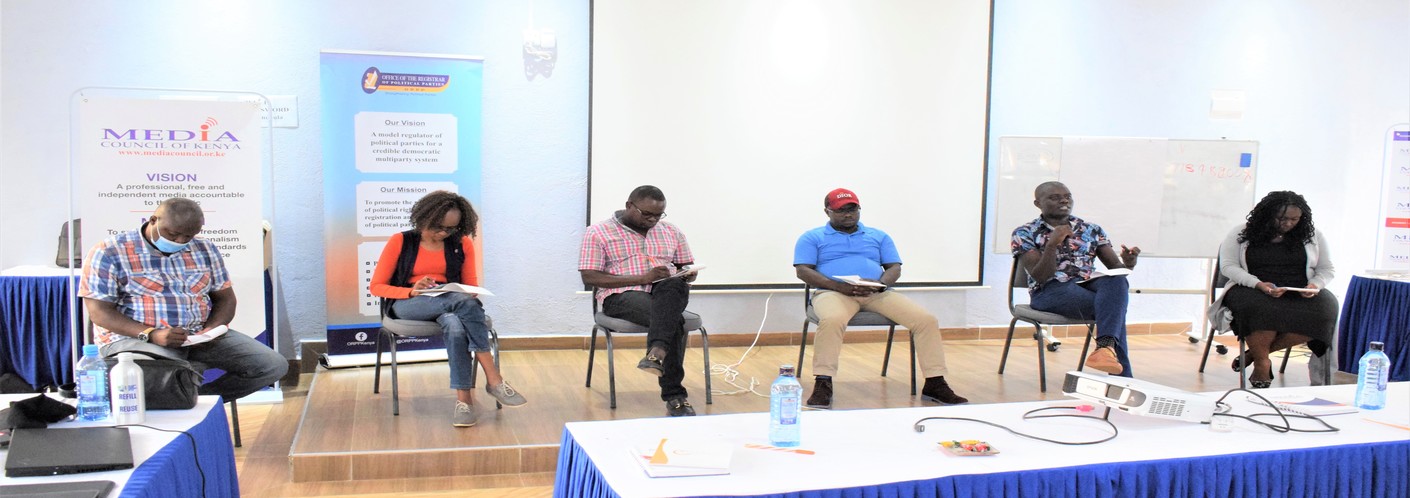
The impact of misreporting of key electoral issues has been cited as a major contributor to lack of public trust in electoral processes.
Participants at a workshop organised by the Media Council of Kenya on media framing of public interest issues during elections quoted the critical place of the media in shaping public opinion on electoral processes. The meeting was attended by editors and the Independent Electoral and Boundaries Commission (IEBC) and the Office of the Registrar of Political Parties (ORPP).
The Registrar of Political Parties Ms Anne Nderitu affirmed her institution’s commitment to collaborations with different stakeholders involved in elections management, to ensure accurate reporting of issues.
She urged the media to critically examine issues around elections and report in simple and accurate manner for the electorate to understand.
“Misreporting on issues about elections is a major impediment to efforts towards making Kenyans to appreciate our electoral processes. It is therefore important that the media reports accurately because retracting wrong reports from the public’s mind may be too late and counterproductive”, said Ms Nderitu.
She took the participants through various areas including the role of the ORPP in the electoral process, the role of political parties and adherence to legal provisions, their rights and timelines.
“We are here to clarify any matters around elections and political parties. Whenever a new law come up there is a lot of misrepresentation and misreporting and as duty bearers we have the responsibility to put the record straight and clarify matters to the media”, said the Registrar of Political Parties.
IEBC Commissioner Mr Justus Nyang’aya said the Commission has made deliberate efforts to robustly engage stakeholders and partners, both state and non-state, it its programmes and activities.
“Public outreach through effective voter education, strategic partnerships, collaboration ad communicating is a key pillar of our 2022-2024 Strategic Plan”, he said.
He elaborated the various collaborative frameworks the Commission has put in place to strengthen its operations and address emerging concerns and emergencies, including election security education, formation of a judicial committee on elections, political parties liaison committee and engagement of key bodies.
Commissioner Nyan’gaya acknowledged the Commission’s appreciation of the media’s role in disseminating information and influencing and shaping public opinion and agenda.
He lauded the various initiatives of the Media Council in preparing the media for the elections. “In appreciation of the media’s role in fostering transparency, the Commission shall allow accredited media access to polling stations and tallying centres on the Election Day to cover the vote counting, announcement, collation and declaration of results. This will ensure that the pubic gets accurate and authentic information and results real time”, he said.
Media Council of Kenya CEO Mr David Omwoyo underlined the place of training and mentorship of journalists as key in elections coverage. “The elections come at a period when most veteran journalist who have previously covered elections have left the newsrooms. Therefore, we are anticipating a situation where up to 20 per cent of those who will be covering this general election will be people who have never covered lections before”, he said.
Mr Omwoyo said the meeting was convened to accord editors practical experiences that they can share in actual newsroom operations when reporting on matters elections.
He cited the critical role of vernacular radio and community media in information sharing during the elections and called for their facilitation to enable them to empower voters on elections.
He said the Council has put in measures to prepare the media for the polls, citing development of the Guidelines for Elections Coverage that will be rolled out to the media across the country. “The Council has constated a team of experts drawn from the newsrooms, industry and highly experienced journalists, media trainers and editors to develop a training manual on coverage of the 2022 polls. The manual is aimed at harmonising the training of journalists on elections reporting across the country including ensuring quality and expertise”, said Mr Omwoyo.
He expressed concerns with proliferation of fake information and its impact on media coverage of electoral processes. “Deep fakes have complicated the war against misinformation. This calls for focus on research and fact-checking, we are setting up collaborations to ensure that verified information is shared and accessed across platform and institutions”, he said.
Mr Omwoyo, called upon media enterprises and newsroom mangers to establish alternative plans to secure their teams while covering lections. “Election violence and attacks against journalist are often spontaneous and all of us need to reflect on measures like branding, evacuation plans and safe houses”, he said while revealing the Council’s plan to engage media houses on commitment to a charter for journalists’ safety.